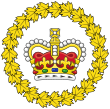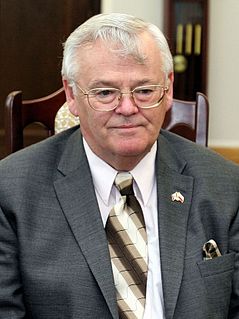| Leader of the Opposition in the Senate Chef de l'opposition au Sénat | |
|---|---|
| Style | The Honourable |
| Member of | Senate of Canada |
| Appointer | Elected by the caucus of the official opposition in the Senate |
| Inaugural holder | Luc Letellier de St-Just |
| Formation | 1 July 1867 |
| Deputy | Deputy Leader of the Opposition in the Senate |
| Salary | $186,900 (2017) [1] |
 |
|---|
| This article is part of a series on the politics and government of Canada |
| Government |
In Canada, the Leader of the Opposition in the Senate (French : Chef de l'opposition au Sénat) is the leader of the largest party in the Senate not in government.

Canada is a country in the northern part of North America. Its ten provinces and three territories extend from the Atlantic to the Pacific and northward into the Arctic Ocean, covering 9.98 million square kilometres, making it the world's second-largest country by total area. Canada's southern border with the United States is the world's longest bi-national land border. Its capital is Ottawa, and its three largest metropolitan areas are Toronto, Montreal, and Vancouver. As a whole, Canada is sparsely populated, the majority of its land area being dominated by forest and tundra. Consequently, its population is highly urbanized, with over 80 percent of its inhabitants concentrated in large and medium-sized cities, many near the southern border. Canada's climate varies widely across its vast area, ranging from arctic weather in the north, to hot summers in the southern regions, with four distinct seasons.

French is a Romance language of the Indo-European family. It descended from the Vulgar Latin of the Roman Empire, as did all Romance languages. French evolved from Gallo-Romance, the spoken Latin in Gaul, and more specifically in Northern Gaul. Its closest relatives are the other langues d'oïl—languages historically spoken in northern France and in southern Belgium, which French (Francien) has largely supplanted. French was also influenced by native Celtic languages of Northern Roman Gaul like Gallia Belgica and by the (Germanic) Frankish language of the post-Roman Frankish invaders. Today, owing to France's past overseas expansion, there are numerous French-based creole languages, most notably Haitian Creole. A French-speaking person or nation may be referred to as Francophone in both English and French.

The Senate of Canada is the upper house of the Parliament of Canada, along with the House of Commons and the Monarch. The Senate is modelled after the British House of Lords and consists of 105 members appointed by the Governor General on the advice of the Prime Minister. Seats are assigned on a regional basis: four regions—defined as Ontario, Quebec, the Maritime provinces, and the Western provinces—each receive 24 seats, with the remaining portions of the country—Newfoundland and Labrador receiving 6 seats and the three northern territories each assigned the remaining one seat. Senators may serve until they reach the age of 75.
Contents
Even though the position's name is very similar to the Leader of the Opposition in the House of Commons (the Opposition House Leader), the Leader of the Opposition in the Senate's role is more analogous to the Leader of the Official Opposition because its holder is the leader of the party's Senate caucus. The responsibilities that, in the House of Commons, are done by the house leaders—including day-to-day scheduling of business—are undertaken in the Senate by Government and Opposition deputy leaders and Opposition whips. [2]
The Leader of Her Majesty's Loyal Opposition is the leader of Canada's Official Opposition, the party possessing the most seats in the House of Commons that is not the governing party or part of the governing coalition. The current Leader of the Opposition is Andrew Scheer, M.P., who was elected Leader of the Conservative Party on May 27, 2017.










